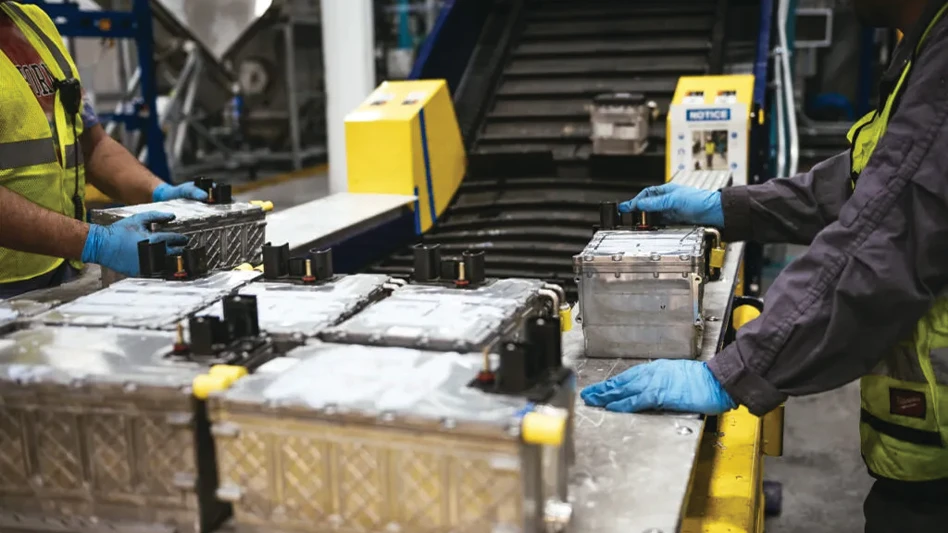
Photo courtesy of American Battery Technology Co.
Reno, Nevada-based battery recycler American Battery Technology Co. (ABTC) says it has achieved a significant milestone by demonstrating a fixed duration operation of its commercial-scale lithium-ion battery (LIB) recycling facility at a steady-state throughput of more than 115 percent of its maximum design rate.
At full production capacity, the facility initially was designed to process 20,000 metric tons of battery feedstock per year, and surpassing this design rate demonstrates the impact of the continued process enhancements that have been implemented in the commissioning of the facility.
RELATED: ABTC hires vice president of financial planning and analysis
“One of the key advantages of commercializing an internally-developed technology is that the team members have a fundamental understanding of every unit operation within the processing train,” says Ryan Melsert, CEO of ABTC. “This allows them to be constantly evaluating the data and operating conditions from the facility in real-time and continuously enhancing the operations, both through incremental day-to-day as well as step-change disruptive improvements. We’re incredibly proud of this team who have taken ownership of the success of this facility as we move to 24/7 operations.”
ABTC’s facility utilizes an integrated set of recycling processes based on a strategic approach that uses a deconstruction process combined with a targeted selective hydrometallurgical process. The company says this system is agnostic to feedstock form factors and can process LIBs and manufacturing scrap of a variety of sizes and shapes, and with a wide range of internal chemistries.
The first phase of the recycling process produces recycled products including copper, aluminum, steel, a lithium intermediate and a black mass intermediate material, and the integrated second phase further refines these materials into battery-grade nickel sulfate, cobalt sulfate, manganese sulfate and lithium hydroxide.
“Having in-house expertise is critical to our continued success and ability to rapidly advance our operations, and I am extremely proud of the tenacity, creativity and collaboration demonstrated by our team every day,” COO Andres Meza says. “Pushing this volume of material through a fully customized, large-scale, complex system is no easy feat, and I am extremely pleased with how smoothly the system is performing overall. Our reliability improvements are paying dividends, and we are now laser-focused on sustainable rate improvements, further operational expenditure reductions and cost efficiencies through automation.”
The company already is in the process of implementing the second phase of its facility, where the lithium intermediate from its first phase process will be further refined into a battery-grade lithium hydroxide product, and the black mass intermediate material will be further refined into battery-grade nickel, cobalt, manganese and lithium hydroxide products.
The technologies used at the facility have been developed in-house by ABTC’s research and development (R&D), engineering and technical project team members, many of whom were previously members of the founding Tesla gigafactory design and engineering teams.
ABTC says these team members have significant experience scaling processes and bringing first-of-kind commercial-scale facilities online and have leveraged this expertise to derisk ABTC’s commercialization of its battery recycling facility. “The teams work symbiotically to drive the development and implementation of ABTC’s first-of-kind technologies and commercial-scale facilities for domestic critical battery material manufacturing,” the company adds.
Latest from Recycling Today
- BMW Group, Encory launch 'direct recycling’ of batteries
- Loom Carbon, RTI International partner to scale textile recycling technology
- Goodwill Industries of West Michigan, American Glass Mosaics partner to divert glass from landfill
- CARI forms federal advocacy partnership
- Monthly packaging papers shipments down in November
- STEEL Act aims to enhance trade enforcement to prevent dumping of steel in the US
- San Francisco schools introduce compostable lunch trays
- Aduro graduates from Shell GameChanger program





